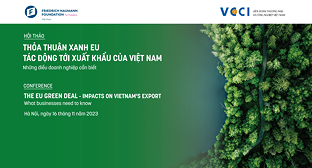Framework for Study Tour and Local Consultant Research on Antidumping in other countries
12/12/2007 12:00
Author: Jürgen Kurtz, Law School, University of Melbourne, Australia
There are a variety of models which Vietnam might follow in adopting an anti-dumping law and administrative framework. The multi-country study will offer a useful mechanism in which to sort and assess the advantages and disadvantages of various approaches undertaken by other countries.
There is however an important external discipline which must be noted on the lessons that can be drawn from the multi-country study. Vietnam is currently negotiating accession for entry into the World Trade Organization (WTO). On accession, Vietnam will be bound by a variety of commitments under the WTO including disciplines on its substantive and procedural processes on anti-dumping. Put simply, Vietnam should ensure that its anti-dumping law and related administrative practices comply with WTO provisions. Any failure to do so risks having its laws declared WTO-illegal at a later stage by the WTO dispute settlement mechanism.
Given this important strategic discipline on Vietnam’s anti-dumping reform process, this outline will predominantly focus on the various WTO disciplines on anti-dumping. This will then allow the participants in the multi-country study to effectively assess the benefits and burdens of the various models adopted in other countries. It is important to recognize that there are no guarantees that a given anti-dumping law in a WTO member state is necessarily compliant with WTO disciplines. As such, it is crucial that the participants in the multi-country study test a given approach against the WTO constraints as part of the broader project of gaining insight into Vietnam’s own law reform process.
This report aims to assist the participants in the multi-country study in this task. It does so as follows.
Part A broadly summarizes the WTO provisions on anti-dumping. Part A.1 examines the substantive WTO disciplines on the key concepts of determining dumping, injury and the causal link between the two. Part A.2 then examines the sorts of procedural disciplines mandated by the WTO. That Part also contains a procedural flowchart setting out the typical stages in an antidumping process with specific timelines.
Part B then examines the six key issue areas raised in the Terms of Reference for this part of the project being: (1) Regulations; (2) Forms and Guidelines; (3) Roles and Responsibilities; (4) Government Administration; (5) Human Resource Needs; and (6) Financial Issues.
There are a variety of models which Vietnam might follow in adopting an anti-dumping law and administrative framework. The multi-country study will offer a useful mechanism in which to sort and assess the advantages and disadvantages of various approaches undertaken by other countries.
There is however an important external discipline which must be noted on the lessons that can be drawn from the multi-country study. Vietnam is currently negotiating accession for entry into the World Trade Organization (WTO). On accession, Vietnam will be bound by a variety of commitments under the WTO including disciplines on its substantive and procedural processes on anti-dumping. Put simply, Vietnam should ensure that its anti-dumping law and related administrative practices comply with WTO provisions. Any failure to do so risks having its laws declared WTO-illegal at a later stage by the WTO dispute settlement mechanism.
Given this important strategic discipline on Vietnam’s anti-dumping reform process, this outline will predominantly focus on the various WTO disciplines on anti-dumping. This will then allow the participants in the multi-country study to effectively assess the benefits and burdens of the various models adopted in other countries. It is important to recognize that there are no guarantees that a given anti-dumping law in a WTO member state is necessarily compliant with WTO disciplines. As such, it is crucial that the participants in the multi-country study test a given approach against the WTO constraints as part of the broader project of gaining insight into Vietnam’s own law reform process.
This report aims to assist the participants in the multi-country study in this task. It does so as follows.
Part A broadly summarizes the WTO provisions on anti-dumping. Part A.1 examines the substantive WTO disciplines on the key concepts of determining dumping, injury and the causal link between the two. Part A.2 then examines the sorts of procedural disciplines mandated by the WTO. That Part also contains a procedural flowchart setting out the typical stages in an antidumping process with specific timelines.
Part B then examines the six key issue areas raised in the Terms of Reference for this part of the project being: (1) Regulations; (2) Forms and Guidelines; (3) Roles and Responsibilities; (4) Government Administration; (5) Human Resource Needs; and (6) Financial Issues.
Các tin khác
- The Dispute Settlement Crisis in the World Trade Organization: Causes and Cures (16/03/2018)
- Modification of trade defence rules regarding non-market economy costs and prices (23/02/2018)
- Research Paper: Options for Disciplining the Use of Trade Remedies in Clean Energy Technologies (03/08/2017)
- Addressing the rise of Trade Remedies against Environmental Goods (03/08/2017)
- Anti-dumping Retaliation - —A Common Threat to International Trade (15/11/2016)
 Home
Home
 About Us
About Us




















